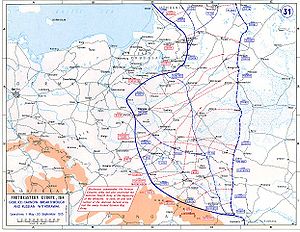Dniester Front
| Battle of Dniestr | |||||||
|---|---|---|---|---|---|---|---|
| Part of the Eastern Front of World War I | |||||||
 Zolota Lypa-Dnestr battle | |||||||
| |||||||
| Belligerents | |||||||
|
|
| ||||||
| Commanders and leaders | |||||||
|
|
| ||||||
| Units involved | |||||||
|
|
| ||||||
The Dniester front a series of battles on the eastern front between Russia and the central powers summer offensive.
Background
The Austro-Hungarian armies, not included in the army group of A. von Mackensen, received passive tasks of pinning down the opposing Russian forces and gradually liberating the territory of eastern Galicia from the Russian troops by attacking Buchach and Chortkiv. Since the left tributaries of the Dniester were natural defensive lines, the commander of the 7th Austro-Hungarian Army, cavalry general Karl von Pflanzer-Baltin, decided to force the Dniester River between the mouths of the Strypa and Seret rivers.
First Khotyn offensive
| Khotyn operation | |||||||
|---|---|---|---|---|---|---|---|
| |||||||
| Belligerents | |||||||
|
|
| ||||||
| Commanders and leaders | |||||||
|
|
| ||||||
| Units involved | |||||||
|
|
| ||||||
| Strength | |||||||
| Unknown | 6 division | ||||||
| Casualties and losses | |||||||
|
3,000 captured 8 machine guns | Unknown | ||||||
A Russian defensive operation to prevent the encirclement of the 9th Army. It ended with the failure of the Austro-Hungarian troops.
Prut operation
| Battle of Prut | |||||||
|---|---|---|---|---|---|---|---|
| |||||||
| Belligerents | |||||||
|
|
| ||||||
| Commanders and leaders | |||||||
|
|
| ||||||
| Units involved | |||||||
|
|
| ||||||
| Strength | |||||||
| Unknown | Unknown | ||||||
| Casualties and losses | |||||||
|
Heavy; including 16,000 captured 20 machine guns | 6,082[2] | ||||||
A Russian sabotage operation in the territory near the Dniester and the Prut. The Russians successfully crossed the Prut, while incurring heavy losses, but after a while they managed to throw back the Austro-Hungarian units from a height in front of the river and capture large trophies at the same time.
Second Khotyn offensive
| Khotyn operation | |||||||
|---|---|---|---|---|---|---|---|
| |||||||
| Belligerents | |||||||
|
|
| ||||||
| Commanders and leaders | |||||||
|
|
| ||||||
| Units involved | |||||||
|
|
| ||||||
| Strength | |||||||
| Unknown | 6 division | ||||||
| Casualties and losses | |||||||
|
8,000 captured 20 machine guns | Unknown | ||||||
Transnistrian operation
| First battle of Dniester | |||||||
|---|---|---|---|---|---|---|---|
| |||||||
| Belligerents | |||||||
|
|
| ||||||
| Commanders and leaders | |||||||
|
|
| ||||||
| Units involved | |||||||
|
|
| ||||||
| Strength | |||||||
| 8 infantry and 5 cavalry division | 9 infantry and 6 cavalry division | ||||||
| Casualties and losses | |||||||
|
25,000 captured 20 guns and 33 machine guns | Relatively small | ||||||
The operation was carried out in order to alleviate the condition of the Russian army against the background of the catastrophe in Galicia. The main force of the 9th Russian army consisted of cavalry and militia squads.[3] Later, the famous Finnish figure Mannerheim also participated in the battle. The Russians were opposed by the 7th army of Austria-Hungary, as well as 2 Polish brigades.[4] Russians launched a large-scale offensive on the morning of April 27, such tactics immediately had an effect and the Russians effortlessly broke through the enemy's front in several places.[5] Some Russian units suffered quite heavy losses, the 1st Trans-Amur division lost up to half of its personnel in the battles for the city of Chernilets, but was able to capture the city and prisoners into the bargain.[6]
Battle of Zuravno
| Battle of Zuravno | |||||||
|---|---|---|---|---|---|---|---|
| |||||||
| Belligerents | |||||||
|
|
| ||||||
| Commanders and leaders | |||||||
|
|
| ||||||
| Units involved | |||||||
|
|
| ||||||
| Strength | |||||||
| Unknown | 8 infantry and 1 cavalry division | ||||||
| Casualties and losses | |||||||
|
28,000 captured 29 guns and 110 machine guns[1] | Unknown | ||||||
The battle began with the German troops advancing on the Russian bridgehead at Zhuravno, it was well fortified and flanked by impassable marshes. The Russian troops were well equipped and eager to fight.[7] The Germans attacked unsuccessfully along the entire front, and apparently in poor morale, as cases were recorded when entire companies of the Prussian Guard surrendered.[8] The Russians heroically defended the bridgehead from the troops of the central powers, capturing prisoners and inflicting losses on the guard.[9] The Russians defeated several corps and pushed them away from the Dniester, but after that they had to retreat due to general failures in Galicia and the withdrawal of Brusilov's 8th army.[10]
Austro-Hungarian troops were unable to cross the Dniester and defeat the Russian troops in eastern Galicia. Their trophies amounted to only 7 machine guns and 5,168 prisoners (34 of them officers).[11] During this time, Russian troops were able to capture more than 80,000 during five operations on this sector of the front.[a]
References
- ^ a b c Oleynikov 2023, p. 33.
- ^ Русская армия в Великой Войне. Прутская операция
- ^ Гильчевский К.Л. Боевые действия второочередных частей в мировую войну М.,1928.С.7
- ^ Oleynikov 2023, p. 280.
- ^ Oleynikov 2023, p. 285.
- ^ Корольков Г.К. Форсирование реки пехотной дивизией М., 1935. С.44
- ^ Oleynikov 2023, p. 303-304.
- ^ Год Войны. P.396
- ^ Österreich-Ungarns Letzter Krieg 1914-1918. Bd. II. Wien, 1931. S. 460.
- ^ Гурко В.И. Война и революция. P.149
- ^ С.Г. Нелипович, 2022, p. 612
- ^ Oleynikov 2023, p. 32.
- ^ Великая война 1915. очерк главнейших операций юго-западного фронта. P.25
Notes
Bibliography
- Oleynikov, А. (2023). Германский натиск на Восток 1915 [The German push to the East 1915] (in Russian). ISBN 978-5-4484-4327-5.
